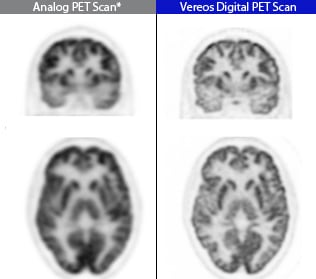 Positron Emission Tomography, also called a PET scan, is a nuclear medicine exam that produces a three dimensional image of functional processes in the body. A PET scan uses a small amount of a radioactive drug to show differences between healthy and diseased tissue. PET/CT combines the fine structural detail of CT with PET’s ability to detect changes in cell function. This combination allows for earlier and more accurate detection of disease than either CT or PET alone. A PET/CT can help your physician diagnose a problem, determine the best approach to treatment or monitor your progress.
Positron Emission Tomography, also called a PET scan, is a nuclear medicine exam that produces a three dimensional image of functional processes in the body. A PET scan uses a small amount of a radioactive drug to show differences between healthy and diseased tissue. PET/CT combines the fine structural detail of CT with PET’s ability to detect changes in cell function. This combination allows for earlier and more accurate detection of disease than either CT or PET alone. A PET/CT can help your physician diagnose a problem, determine the best approach to treatment or monitor your progress.
Peninsula Imaging’s mission is to stay at the forefront of radiology. This includes utilizing innovative imaging technology. Our fully digital Philips Vereos PET/CT scanner reduces patient scan time by half, while significantly reducing radiation dose and provides greater detail and sensitivity. This state-of-the-art technology greatly advances the community’s cancer care.
- You should wear comfortable, loose-fitting clothes.
- Nothing to eat for 6 hours prior to test. You may drink as much water as you want. But only water! We prefer you drink at least 2-16 ounces bottle/glasses of water. No chewing gum, or cough drops.
- Avoid caffeine and nicotine for 6 hours prior to the test.
- Hold all medications the morning of the test except medications for pain or anxiety which may be taken with water.
- Diabetic patients need to monitor blood glucose readings the morning of the test.
- Glucose levels need to be under 200mg/dl. If the reading is 200mg/dl or above please call Peninsula Imaging at 410-749-1123.
- No sex for 24 hours prior to the exam.
- No exercise 48 hours before the exam.
You will receive an intravenous (IV) injection of the radioactive substance. In some cases it may be given through an existing intravenous line.
The radioactive substance will then take approximately 60 minutes to travel through the body and be absorbed by the tissue. During this time, you will be asked to rest quietly and avoid significant movement or talking, which may alter the localization of the administered substance. You will be positioned on the PET scanner table and asked to lie still during your exam. Scanning takes 20 to 45 minutes. Usually there are no restrictions on daily routine after the test. You should drink plenty of fluids to flush the radioactive substance from your body.
The diagnostic images produced by PET are used to evaluate a variety of diseases. These include, but are not limited to:
Cardiology
- Determine what heart tissue is still alive following a suspected heart attack
- Predict success of angioplasty (balloon) by-pass surgery
- Evaluate the heart for blood flow, heart function and signs of coronary artery disease
Neurology
- Detect Alzheimer’s and other dementia
- Determine the precise location for Epilepsy surgery
- Diagnose Parkinson’s and other movement disorders
- Evaluate the brain for memory disorders, brain tumors, and seizure disorders
Oncology
- Determine benign from malignant tumor in suspicious areas
- Survey the whole body for cancer that may have spread
- Monitor success of therapy
- Detect recurrent tumors
